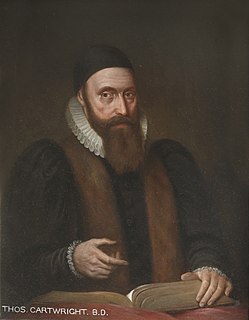Related Research Articles

Richard Bancroft was an English churchman, Archbishop of Canterbury from 1604 to 1610 and "chief overseer" of the King James Bible.

John Whitgift was the Archbishop of Canterbury from 1583 to his death. Noted for his hospitality, he was somewhat ostentatious in his habits, sometimes visiting Canterbury and other towns attended by a retinue of 800 horses. Whitgift's theological views were often controversial.

Thomas Cartwright was an English Puritan preacher and theologian.

Matthew Hutton (1529–1606) was archbishop of York from 1595 to 1606.
Richard Curteys (c.1532?–1582) was an English churchman. A native of Lincolnshire, after his education at St. John's, Cambridge he was ordained and eventually became Chaplain to Queen Elizabeth I. He was made the Dean of Chichester Cathedral and then Bishop of Chichester. Curteys was reputedly a promoter of preaching and the clerical improvement of Anglicanism. In Curteys' episcopate, the cost of supporting many residentiaries and providing hospitality, could not be funded by the relatively small income of Chichester Cathedral. Curteys remodelled the constitution to reduce costs. Despite the changes Curteys died penniless.
Robert Some (Soame) (1542–1609) was an English churchman and academic. Master of Peterhouse, Cambridge from 1589, Some played a prominent part in the ecclesiastical controversies of his time, taking a middle course, hostile alike to extreme Puritans and Anglicans.
Walter Haddon LL.D. (1515–1572) was an English civil lawyer, much involved in church and university affairs under Edward VI, Queen Mary, and Elizabeth I. He was a University of Cambridge humanist and reformer, and was highly reputed in his time as a Latinist. He sat as an MP during the reigns of Mary and Elizabeth. His controversial exchange with the Portuguese historian Jerónimo Osório attracted international attention partly on account of the scholarly reputations of the protagonists.
Perceval Wiburn or Wyburn (Percival) (1533?–1606?) was an English clergyman, a Marian exile, suspected nonconformist and Puritan, and polemical opponent of Robert Parsons.
Thomas Drant (c.1540–1578) was an English clergyman and poet. Work of his on prosody was known to Sir Philip Sidney and Edmund Spenser. He was in the intellectual court circle known as the 'Areopagus', and including, as well as Sidney, Edward Dyer, Gabriel Harvey, and Daniel Rogers. He translated Horace into English, taking a free line in consideration of the Roman poet's secular status; but he mentioned he found Horace harder than Homer. Drant's translation was the first complete one of the Satires in English, in fourteeners, but makes some radical changes of content.
Richard Howland (1540–1600) was an English churchman and academic, Master of Magdalene College, Cambridge, and of St John's College, Cambridge, and bishop of Peterborough.
Nicholas Robinson was a Welsh bishop of Bangor.
Richard Longworth was an English churchman and academic, Master of St John's College, Cambridge and Dean of Chester.
Thomas Yale (1525/6–1577) was an English civil lawyer.
James Calfhill (1530?–1570) was an Anglican priest, academic and controversialist, who died as Archdeacon of Colchester and Bishop-designate of Worcester.
William Hughes was a Welsh bishop of St Asaph.
John Pory (1502/03–1570) was an English churchman and academic, Master of Corpus Christi College, Cambridge.
John Sanderson was an English Roman Catholic priest, known as a writer on logic.
John Copcot, DD was an English cleric and academic, becoming Vice-Chancellor of the University of Cambridge and Master of Corpus Christi College, Cambridge.
Roger Kelke (1524–1576) was an English churchman and academic, a Marian exile and Master of Magdalene College, Cambridge from 1558 and Archdeacon of Stow from 1563.
Francis Newton was an English clergyman who served as Dean of the Winchester Cathedral from 1565 until his death in 1572.
References
- ↑ "Beaumont, Robert (BMNT543R)". A Cambridge Alumni Database. University of Cambridge.
- 1 2 3 4 5 . Dictionary of National Biography . London: Smith, Elder & Co. 1885–1900.
- ↑ Stephen, Leslie, ed. (1889). . Dictionary of National Biography . 20. London: Smith, Elder & Co.
- ↑ Greaves, Richard L. Oxford Dictionary of National Biography (online ed.). Oxford University Press. doi:10.1093/ref:odnb/1884.Missing or empty
|title=(help)(Subscription or UK public library membership required.) - ↑ Ford, Alan. "Travers, Walter". Oxford Dictionary of National Biography (online ed.). Oxford University Press. doi:10.1093/ref:odnb/27673.(Subscription or UK public library membership required.)
- Attribution
![]() This article incorporates text from a publication now in the public domain : "Beaumont, Robert (d.1567)". Dictionary of National Biography . London: Smith, Elder & Co. 1885–1900.
This article incorporates text from a publication now in the public domain : "Beaumont, Robert (d.1567)". Dictionary of National Biography . London: Smith, Elder & Co. 1885–1900.